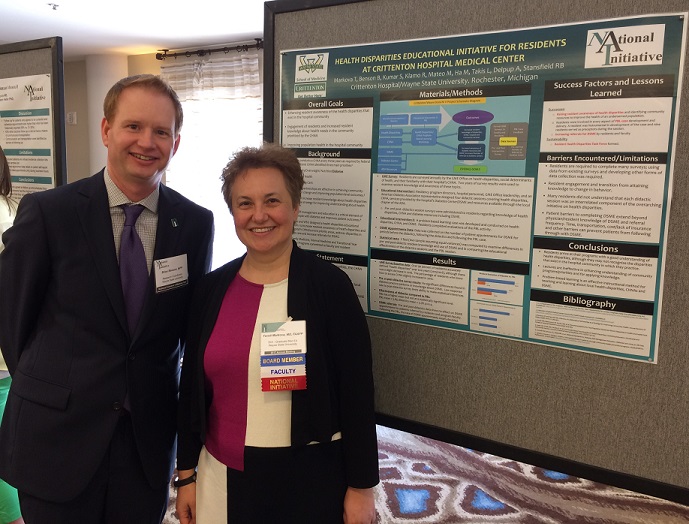
The Wayne State University School of Medicine's Graduate Medical Education program and Crittenton Hospital Medical Center were recognized in March for their successful completion of "National Initiative V": Improving Community Health and Health Equity through Medical Education." The initiative was sponsored by the Alliance of Independent Academic Medical Centers, a national membership organization based in Chicago.
The AIAMC National Initiative is the only national and multi-institutional collaborative of its kind in which resident physicians lead multidisciplinary teams in quality improvement projects aligned to their institution's strategic goals. Fifty-eight hospitals and health systems and nearly 700 individuals have participated in the AIAMC National Initiative since 2007 and have driven change that resulted in meaningful and sustainable outcomes that improved the quality and safety of patient care. Twenty-nine AIAMC-member hospitals and health systems were selected to participate in National Initiative V.
Tsveti Markova, M.D., F.A.A.F.P., WSU's associate dean for Graduate Medical Education and designated institutional official, represented the institutions at the AIAMC's annual awards dinner held March 31 in Amelia Island, Fla.
"We were honored to be selected for this prestigious award and will continue to champion innovation in medical education with the ultimate goal of improving quality of care and patient safety," said Dr. Markova, who also serves as chair of the WSU Department of Family Medicine and Public Health Sciences.
Wayne State University and Crittenton Hospital were selected to participate based upon their demonstrated commitment to better understanding and reducing health disparities in the community. Since the fall of 2015, participants from the WSU GME Office, faculty and residents attended four on-site learning sessions as well as monthly networking teleconferences and educational webinars. The project focused on health disparities educational initiative for family medicine, internal medicine and transitional year residents at Crittenton Hospital Medical Center. The project accomplished several goals: enhancing resident awareness of the health disparities that exist in the hospital community, engagement of residents and increased resident knowledge about health needs in the community prioritized by the Community Health Needs Assessment, and improving population health in the hospital community.
"Five National Initiatives and 10 years have passed since we embarked upon these innovative collaborations," said Kimberly Pierce-Boggs, AIAMC executive director. "The work of our 29 member institutions has been inspiring and impactful. Wayne State University and Crittenton Hospital represent the best of forward-thinking academic medical centers that proactively address community health needs while at the same time reforming residency training by involving trainees directly in community-based initiatives."
Wayne State University and Crittenton Hospital Medical Center plan to participate in the next National Initiative VI: Stimulating a Culture of Well-Being in the Clinical Learning Environment. Studies demonstrate that the net impact of the mounting pressures of clinical care is escalating physician burnout and depression. Layered on these challenges is the stigma many physicians in training and practice encounter related to acknowledging that they need help. Participants will be equipped to meet the Accreditation Council for Graduate Medical Education's new Common Program Requirements, approved for the 2017-18 academic year. The WSU GME Office is already actively embarking on this initiative. Dr. Markova and R. Brent Stansfield, Ph.D., director of Education in the WSU GME Office, recently presented at two national meetings the development of a validated instrument to evaluate wellness, the Resident Wellness Scale. The RWS is a 10-item scale that shows some empirical evidence of reliability and convergent validity. It is positively worded and sensitive to variation in wellness, not just to depression or burnout. It is the first step in building an open-source, scalable instrument for monitoring the state of and longitudinal changes in residents' well-being at the individual, program and institution levels.
In 2013, Wayne State University and Crittenton Hospital Medical Center were honored by the AIAMC with the Alliance Innovation Award for the design and implementation of project "Aligning Graduate Medical Education with Hospital's Quality Improvement and Safety Strategies" for demonstrating an institution-wide change in the development and implementation of innovative medical education programs for residents, physicians and staff, leading to improved patient outcomes.